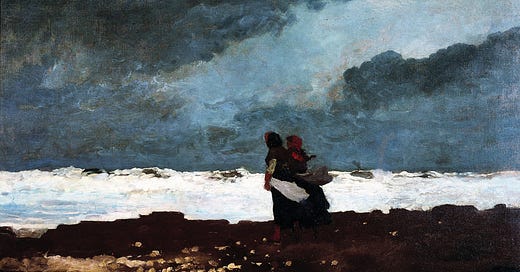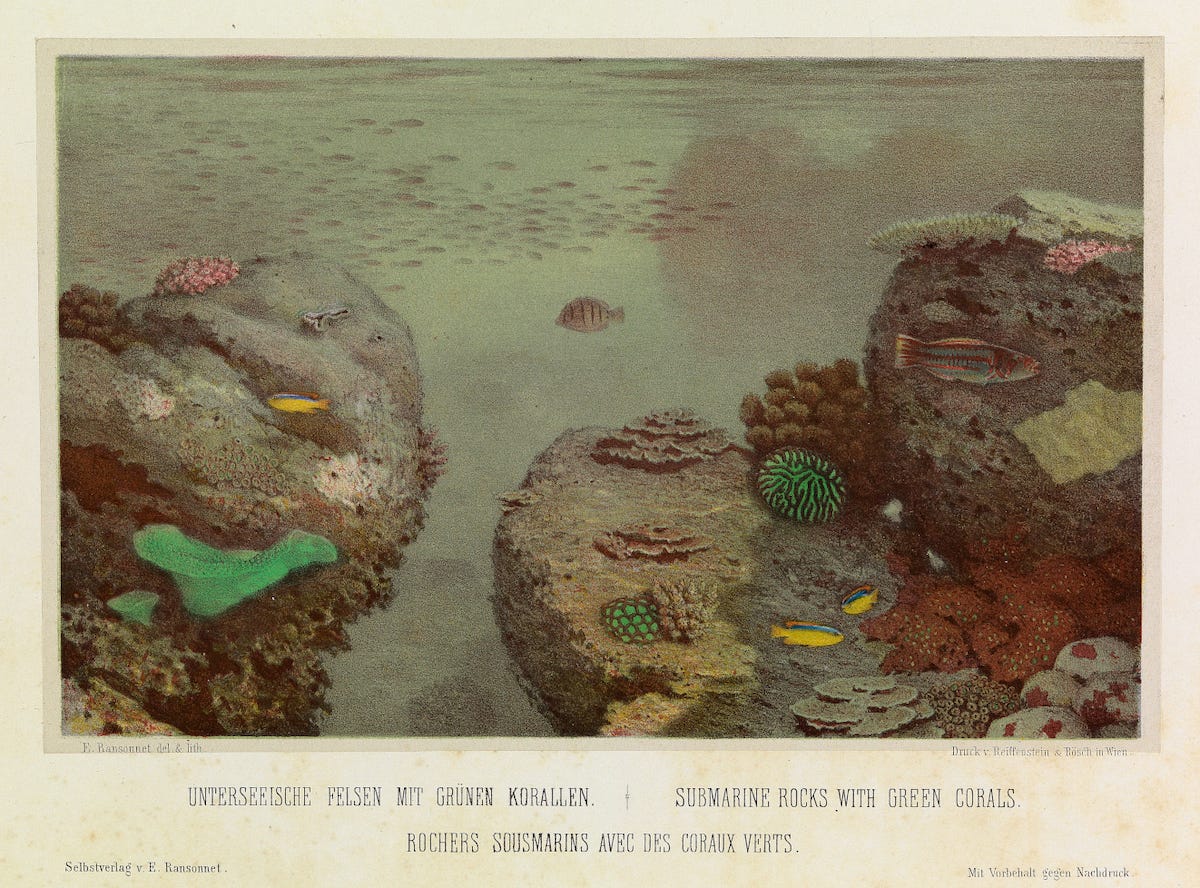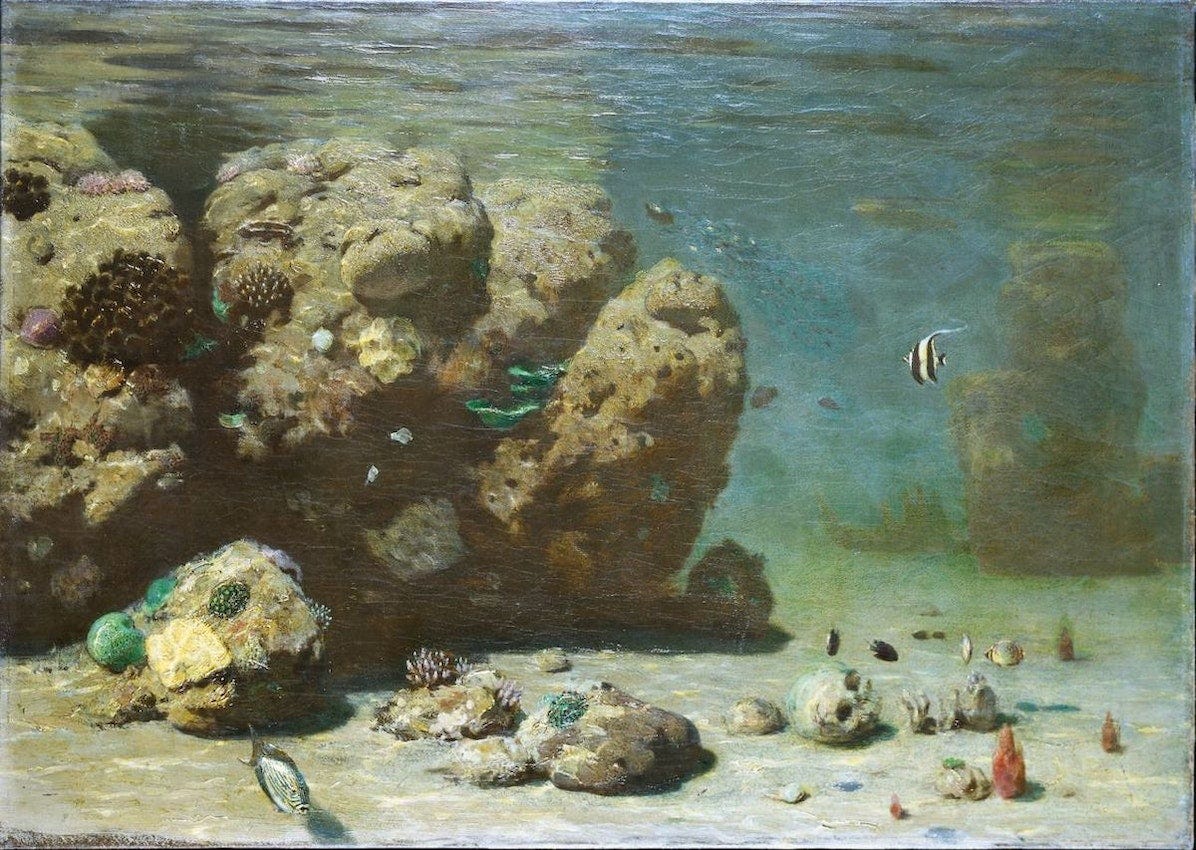Learning to Swim
Dive into Kate Chopin's feminist novella, which created controversy for the author when it was published in 1899.
From The Awakening by Kate Chopin
The people walked in little groups toward the beach. They talked and laughed; some of them sang. There was a band playing down at Klein’s hotel, and the strains reached them faintly, tempered by the distance. There were strange, rare odors abroad—a tangle of the sea smell and of weeds and damp, new-plowed earth, mingled with the heavy perfume of a field of white blossoms somewhere near. But the night sat lightly upon the sea and the land. There was no weight of darkness; there were no shadows. The white light of the moon had fallen upon the world like the mystery and the softness of sleep.
Most of them walked into the water as though into a native element. The sea was quiet now, and swelled lazily in broad billows that melted into one another and did not break except upon the beach in little foamy crests that coiled back like slow, white serpents.
Edna had attempted all summer to learn to swim. She had received instructions from both the men and women; in some instances from the children. Robert had pursued a system of lessons almost daily; and he was nearly at the point of discouragement in realizing the futility of his efforts. A certain ungovernable dread hung about her when in the water, unless there was a hand near by that might reach out and reassure her.
But that night she was like the little tottering, stumbling, clutching child, who of a sudden realizes its powers, and walks for the first time alone, boldly and with over-confidence. She could have shouted for joy. She did shout for joy, as with a sweeping stroke or two she lifted her body to the surface of the water.
A feeling of exultation overtook her, as if some power of significant import had been given her to control the working of her body and her soul. She grew daring and reckless, overestimating her strength. She wanted to swim far out, where no woman had swum before.
Her unlooked-for achievement was the subject of wonder, applause, and admiration. Each one congratulated himself that his special teachings had accomplished this desired end.
“How easy it is!” she thought. “It is nothing,” she said aloud; “why did I not discover before that it was nothing. Think of the time I have lost splashing about like a baby!” She would not join the groups in their sports and bouts, but intoxicated with her newly conquered power, she swam out alone.
She turned her face seaward to gather in an impression of space and solitude, which the vast expanse of water, meeting and melting with the moonlit sky, conveyed to her excited fancy. As she swam she seemed to be reaching out for the unlimited in which to lose herself.
The painting featured above is Winslow Homer, Two Figures by the Sea (1882)
What we love about this passage…
The sea’s vast, seemingly unlimited quality has long been an inspiration to writers. In Chopin’s novella its formlessness offers an enticing alternative to life on land. It also serves as a symbol of Edna’s independence from her society, one that allows her freedom and independence, but is cloaked in mystery and solitude. We can’t help but think of the general interest in the sea in this period by scientists, explorers, and writers — all of whom were coming to terms with what could almost seem like the bizarre alien world living alongside us –– or, just below the surface.
About the Author
Kate Chopin (1850-1904) was born Kate O’Flaherty in St Louis, Missouri. After her marriage to Oscar Chopin, she settled in turn-of-the-century New Orleans: a permissive, cosmopolitan, and diverse enclave that left a deep impression on her life. She was left near bankruptcy after the death of her husband due to his unpaid debts, and turned to writing in order to make an income. Alongside The Awakening, she is best known for her shorter works, such as ‘The Story of an Hour’ and ‘An Egyptian Cigarette’ — both of which were originally published in the then up and coming Vogue magazine.
To read alongside…
The sea, the sea—it’s hard not to think of an ocean of references to what covers over 70% of our planet. For another work that makes us think of feminism and the sea, there’s Henrik Ibsen’s The Lady From the Sea (1888): a play about a woman who is obsessed with what we would now call ‘wild swimming,’ and who believes that human beings were originally sea creatures who have somehow evolved to become land dwellers, but are ill adapted to it. She is visited by a long lost lover, The Stranger, who is—you guessed it—a sailor, and has to choose between him and her husband.
Why not explore our newsletters dedicated to another, less well-known New Orleans writer of note from the same period, Alice Moore Dunbar-Nelson? Read her poems ‘At Bay St Louis’ and ‘Sonnet’. You may also want to revisit another major nineteenth-century writer famous for writing about the sea, Herman Melville.
The underwater landscapes are by Eugen Ransonnet-Villez and you can see more of his work here The Public Domain Review.
Suggest a LitHit!
Tell us your own favourites from literature you've read, and we can feature you as a Guest Curator. Just email us with the following information:
Your full name
The title of the book you're suggesting
The location of the excerpt within the book (e.g., "in the middle of chapter 5"), or the excerpt itself copied into the email or attached to it (in Word)
Why you love it, in just a few sentences
About LitHits
LitHits helps you make time for reading by bringing you unabridged excerpts from brilliant literature that you can read on the go, anytime or any place. Our curators carefully select and frame each excerpt so that you can dive right in. We are more than a book recommendation site: we connect you with a powerful, enduring piece of literature, served directly to your mobile phone, tablet or computer.
Today's guest curator...
Dr Daniel Abdalla, core member of LitHits and an expert in nineteenth and twentieth-century literature, particularly its relationship to science.
You might also enjoy...
Feedback
We'd love to hear your thoughts on our newsletter:
kirsten@lit-hits.co.uk
Graphic design by Sara Azmy
All curation content © 2023 LitHits. All rights reserved.






